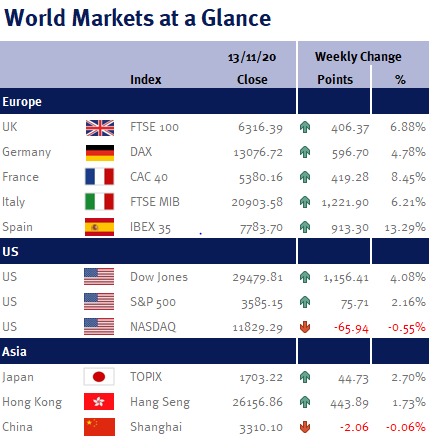It has been an emotional roller coaster ride this week: on the one hand front page news headlines on new infections, hospitalisations and deaths continued to worsen; and on the other hand we had positive findings from Pfizer’s (a US pharmaceutical company) coronavirus vaccine which set global equity markets alight this week.
We appreciate that this equity market euphoria may seem strange given it will still take time to finish the vaccine’s development and approval. Not to mention produce and distribute, meaning that we are only going to see infections and death numbers continue to grow in the coming months as coronavirus will be with us well into next year. However, the medium-term outlook is very bright, as not only will a coronavirus vaccine bring some sense of normalcy to our lives, but more importantly, a vaccine will allow economies to fully reopen and thus speed up the economic recovery.
Of course, equity markets never go up in a straight line and we should all be ready for a few more speed bumps in the road, as the tug-of-war between the upsetting virus numbers coupled with the negative short-term economic impact of localised lockdowns, versus positive vaccine development announcements and the economic recovery, is going to ensure the equity market volatility remains elevated. However, equity markets will ultimately focus on the economic recovery a vaccine will bring and thus while it is easier said than done, long-term investors shouldn’t be overly worried about these short-term up and down swings and market noise.
As Benjamin Graham (an influential economist and investor) famously stated, the equity market is a voting machine in the short term, but a weighing machine in the long term – i.e. fickle emotions cause equity markets to overreact to information, but that eventually the fundamentals win out.
Economic data this week showed that the UK economy grew by 15.5% during the third quarter of this year. While this growth is the most on record, it does follow a 19.8% contraction in Q2 and while the final quarter of the year maybe difficult given the current lockdown restrictions, our 2021 growth expectations remain very positive.
In the US, the weekly US jobless claims data continued to decline (which is positive), with continuing claims (which reflects the total number of Americans claiming unemployment benefits) coming it at 6.8m, which compares to 24.9m at its peak in May.
Looking ahead to this coming week, we have US retail sales and industrial production data, along with the Empire State Manufacturing Survey and the weekly US jobless claims data; UK CPI inflation and retail sales; Chinese industrial production and retail sales; and Japanese Q3 GDP.
Investment Management Team


